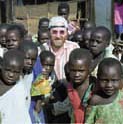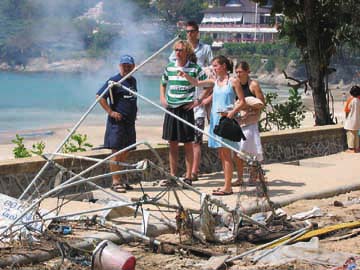Editor’s note: Margaret Loewen Reimer, Canadian Mennonite
’s Managing Editor, is leaving her position at the end of January with our deep thanks for her 31 years of service. I am glad to introduce Ross W. Muir who will fill the position. He will be the only other full-time employee at the magazine (in addition to me) and will play a key role in bringing a high quality Canadian Mennonite
to you that is both a blessing to the church and that spurs each of us to greater endeavours (as he says below). I’ve asked him to introduce himself to the church.
Upon learning that the position of Managing Editor of
Canadian Mennonite had been held by one person—Margaret Loewen Reimer—for more than 30 years, I told Timothy Dyck in my application that I hoped I wasn’t being like the fool rushing in where
 |
| Ross Muir (wearing the hat) is surrounded by Grade 1 students at the Unyama Internally Displaced Persons Camp in northern Uganda, where a civil war involving the abduction of children to act as soldiers and sex slaves has been going on for nearly two decades. |
angels fear to tread. But after a lengthy period as a newspaper journalist and editor, which I left in 1999 to pursue a theological degree, I have been feeling the pull to put my experience and education to use for God and his kingdom in some form of journalistic enterprise.
That tug of God has remained since my graduation in 2002, during which time I have worked for short stints again in the newspaper and trade publication industry, and as a communications writer for World Vision Canada.
My life in journalism really began in 1987, when my wife and I moved with our young son to Manitoulin Island in northern Ontario. My plan had been to work on some creative writing projects and live in relative isolation for a couple of years, but God had other plans. I introduced myself to the local newspaper publisher shortly after arriving on what the locals know simply as “the Island,” and found myself conscripted as a proofreader. While I had worked on a couple of Christian newsletters while living in Toronto in the mid-1980s, this was my first foray into paid professional journalism.
I went on to be a freelance reporter and photographer, and after a year I was hired by
The Manitoulin Expositor as its first full-time reporter. In 1995, the editor left and I assumed the role for four years.
As a newcomer to the Island (unless you were born there, you’re always a newcomer to the locals), it became clear very quickly that the chief aim of the paper and its writers was to tell the Island’s “story:” to cover the issues, the events and the people who defined Manitoulin Island and its way of life in an engaging yet truthful fashion.
As with our move to Manitoulin Island, I am now a newcomer to Canadian Mennonite and the Mennonite church and culture. Born into a Fellowship Baptist family, I have worshiped and served in Convention Baptist, Nazarene and independent evangelical congregations since my coming to personal faith in Jesus Christ in 1972.
I see my role as the denominational publication’s new Managing Editor as being a facilitator of its current cadre of national and regional correspondents, and, in time, a writer of the Mennonite story myself.
What is the story of the people of God? From my recent studies at Tyndale Seminary in Toronto, where I earned a Diploma in Christian Studies and a Master of Theological Studies degree, I believe there are two main chapters to our story. Like Abraham of old, we are blessed. But we are not blessed merely for our own sake alone. We are blessed to be a blessing to others. To put it in New Testament terms, we are saved to serve.
One of my favourite quotes is by David Stendl-Rast, who says, “All the joy of heaven is yours for the taking—no, for the giving of yourself. That is God’s kingdom and conversion. That is what Jesus preached.”
In practical terms, then, I see
Canadian Mennonite continuing its tradition of proclaiming that we are truly blessed as the people of God and spurring each other on to even greater endeavours by profiling those congregations and individual Christians who are used by God in the giving of themselves to bless others—whether within the church or in the wider world.
I pray that, in my new role, I will prove to be a blessing to
Canadian Mennonite and its readers, as Margaret has been in the past.—
Ross W. Muir



